Wildcrafted skincare you need to know about now
A new crop of skincare brands is leading the way for wild, natural beauty products that are not only earth-friendly but are highly effective and luxe to use too
NEW BEAUTY: WILDCRAFTED, SUSTAINABLE SKINCARE
Since lockdown, we have unequivocally turned to nature. From heading to the park for a socially distanced picnic to wading into wild, tree-lined swimming spots – the therapeutic properties of fields, flowers and plants have been a real respite from the same four walls, and we have appreciated every single fragrant second.
So it comes as no surprise that an interest in getting back to nature, along with all that comes with it – including foraging – has been aroused, from the hunting and gathering of flowers and berries included into weekend pursuits to working out ways on how to introduce more greenery into our homes.
It also goes hand-in-hand with our interest for cleaner beauty regimes too, with conscious consumerism at an all-time high and skincare users continuing to scrutinise what's in the formulations, along with transparent ingredient lists and a company's ethos on sustainability. It appears the trend for 'clean' regimes sees no signs of abating.
Going one step further are some of the most stylish, eco-luxury skincare brands on the planet. They're not only earth-friendly, embracing foraged ingredients, but they're high-tech too.
Wildcrafting (also known as foraging) is the practice of harvesting plants from their natural, or 'wild' habitat, primarily for food or medicinal purposes. It applies to uncultivated plants wherever they may be found, and is not necessarily limited to wilderness areas. Ethical considerations are often involved, such as protecting endangered species and depleting commonly held resources.
America has foraged beauty brands Alpyn and Flynn & King, but championing the way for the UK is the Rhug Estate and Farm, which has been organic for over 20 years and is now launching Rhug Wild Beauty. The Estate is an unspoilt landscape of mountains, organic clover-rich pastures, trees, hedgerows, rivers and lakes, where the air is fresh and the nurtured organic land supports an abundance of wildlife. The wild plants in residence are plenty and include dandelion, elderflower, nettle, lemon balm, heather and hawthorn, to name a few, along with honey and beeswax from 40 hives, organic oat milk and spring water.
Lord Newborough, the owner of the Rhug, says,
'For many years we supplied wild herbs from the estate to chefs to provide flavour and decorate their dishes. I have been intrigued through many conversations with Richard Prideaux, our Estate Forager, about the many beneficial properties these plants and herbs have on the skin. To give you a few examples: nettle leaf has anti-inflammatory, antioxidant, and antimicrobial properties, which help improve skin health. It also contains vitamins A, C, D and B, which boost skin radiance. This is one of the wild ingredients from the Estate that we use in our Purifying Cleansing Lotion and our Rebalancing Skin Tonic. Our Active Treatment Serum contains herb Robert, which is known to have astringent properties to help tone the skin. We also produce a Nourishing Eye Cream with Elderflower, which reduces the effects of environmental aggressors that can cause premature signs of ageing.'
The ingredient footprint is closely monitored and ingredients and supplies geo-logged, and Lord Newborough adds:
'We deliberately chose plants that we knew had skincare benefits but were also in abundant enough supply to ensure that we would always have sufficient quantities for the collection. They are picked at the right moment and follow meticulous harvesting rules to ensure sustainable growth and stimulating regrowth. When wildcrafting is done sustainably and with proper respect, generally only the fruit, flowers, or branches from plants are taken and the living plant is left. If it is necessary to take the whole plant, seeds are placed in the empty hole from which the plant was taken. Care is taken to remove only a few plants, flowers, or branches, so plenty remains to continue the supply. This also means that the ingredients are clean, free from toxins, grown without pesticides – so less mired in chemicals and potentially more nutrient-dense and hardworking. Sustainability is at the heart of everything we do at Rhug.'
This farm to face mentality and ethos of 'not' going that extra mile to source raw and fully traceable ingredients can only be a good thing for us, and the planet. Try the natural range now.
Nourishing Eye Cream with Elderflower, £85
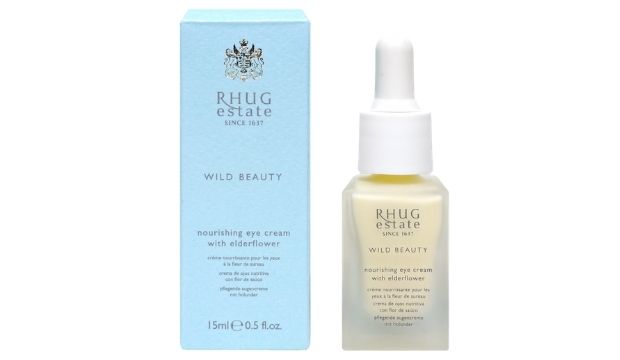
Nourishing Eye Cream with Elderflower, £85 – buy here
Purifying Cleansing Lotion with Dandelion, £55
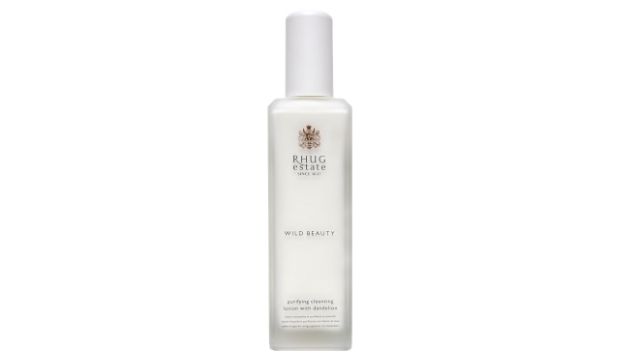
Purifying Cleansing Lotion with Dandelion, £55 – buy here
Active Treatment Serum with Hyaluronic Acid, £115
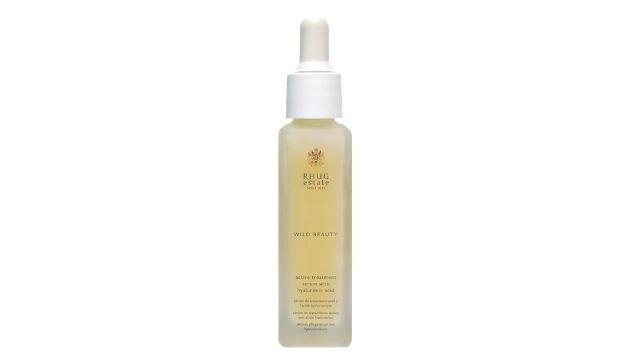
Active Treatment Serum with Hyaluronic Acid, £115 – buy here
Replenishing Mask with Rhug Honey, £75
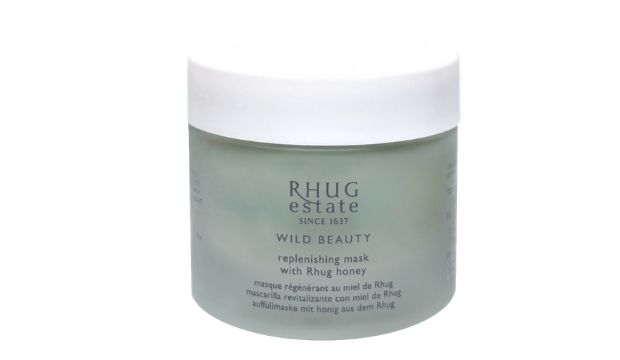
Replenishing Mask with Rhug Honey, £75 – buy here
Restorative Overnight Cream with Evening Primrose, £110
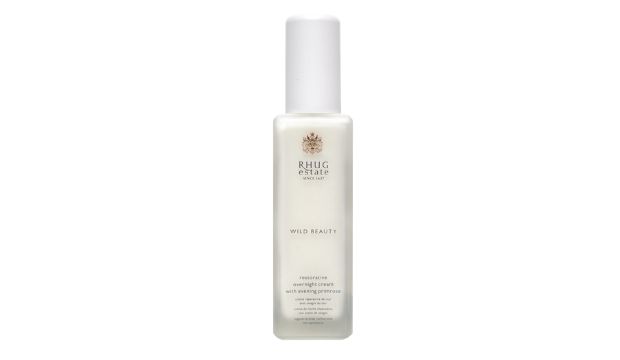
Restorative Overnight Cream with Evening Primrose, £110 – buy here
So it comes as no surprise that an interest in getting back to nature, along with all that comes with it – including foraging – has been aroused, from the hunting and gathering of flowers and berries included into weekend pursuits to working out ways on how to introduce more greenery into our homes.
It also goes hand-in-hand with our interest for cleaner beauty regimes too, with conscious consumerism at an all-time high and skincare users continuing to scrutinise what's in the formulations, along with transparent ingredient lists and a company's ethos on sustainability. It appears the trend for 'clean' regimes sees no signs of abating.
Going one step further are some of the most stylish, eco-luxury skincare brands on the planet. They're not only earth-friendly, embracing foraged ingredients, but they're high-tech too.
Wildcrafting (also known as foraging) is the practice of harvesting plants from their natural, or 'wild' habitat, primarily for food or medicinal purposes. It applies to uncultivated plants wherever they may be found, and is not necessarily limited to wilderness areas. Ethical considerations are often involved, such as protecting endangered species and depleting commonly held resources.
America has foraged beauty brands Alpyn and Flynn & King, but championing the way for the UK is the Rhug Estate and Farm, which has been organic for over 20 years and is now launching Rhug Wild Beauty. The Estate is an unspoilt landscape of mountains, organic clover-rich pastures, trees, hedgerows, rivers and lakes, where the air is fresh and the nurtured organic land supports an abundance of wildlife. The wild plants in residence are plenty and include dandelion, elderflower, nettle, lemon balm, heather and hawthorn, to name a few, along with honey and beeswax from 40 hives, organic oat milk and spring water.
Lord Newborough, the owner of the Rhug, says,
'For many years we supplied wild herbs from the estate to chefs to provide flavour and decorate their dishes. I have been intrigued through many conversations with Richard Prideaux, our Estate Forager, about the many beneficial properties these plants and herbs have on the skin. To give you a few examples: nettle leaf has anti-inflammatory, antioxidant, and antimicrobial properties, which help improve skin health. It also contains vitamins A, C, D and B, which boost skin radiance. This is one of the wild ingredients from the Estate that we use in our Purifying Cleansing Lotion and our Rebalancing Skin Tonic. Our Active Treatment Serum contains herb Robert, which is known to have astringent properties to help tone the skin. We also produce a Nourishing Eye Cream with Elderflower, which reduces the effects of environmental aggressors that can cause premature signs of ageing.'
The ingredient footprint is closely monitored and ingredients and supplies geo-logged, and Lord Newborough adds:
'We deliberately chose plants that we knew had skincare benefits but were also in abundant enough supply to ensure that we would always have sufficient quantities for the collection. They are picked at the right moment and follow meticulous harvesting rules to ensure sustainable growth and stimulating regrowth. When wildcrafting is done sustainably and with proper respect, generally only the fruit, flowers, or branches from plants are taken and the living plant is left. If it is necessary to take the whole plant, seeds are placed in the empty hole from which the plant was taken. Care is taken to remove only a few plants, flowers, or branches, so plenty remains to continue the supply. This also means that the ingredients are clean, free from toxins, grown without pesticides – so less mired in chemicals and potentially more nutrient-dense and hardworking. Sustainability is at the heart of everything we do at Rhug.'
This farm to face mentality and ethos of 'not' going that extra mile to source raw and fully traceable ingredients can only be a good thing for us, and the planet. Try the natural range now.
RHUG WILD BEAUTY
Nourishing Eye Cream with Elderflower, £85

Nourishing Eye Cream with Elderflower, £85 – buy here
Purifying Cleansing Lotion with Dandelion, £55

Purifying Cleansing Lotion with Dandelion, £55 – buy here
Active Treatment Serum with Hyaluronic Acid, £115

Active Treatment Serum with Hyaluronic Acid, £115 – buy here
Replenishing Mask with Rhug Honey, £75

Replenishing Mask with Rhug Honey, £75 – buy here
Restorative Overnight Cream with Evening Primrose, £110

Restorative Overnight Cream with Evening Primrose, £110 – buy here
TRY CULTURE WHISPER
Receive free tickets & insider tips to unlock the best of London — direct to your inbox